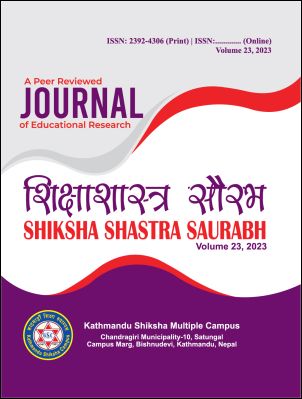Practices of Assessment Tools in Teaching-Learning Activities in Public Schools of Nepal
DOI:
https://doi.org/10.3126/sss.v23i1.51933Keywords:
Achievement, assessment, evaluation, formative, learning, summativeAbstract
This study explores the practices of assessment tools in the teaching-learning activities practised by the public schools of Nepal. Different theoretical ideas regarding the assessment like forms, purposes, and issues are discussed thematically based on the data-related literature. To find out the issues or gaps in assessment practices in Nepal, both primary (interviews with the Headteachers, students, and teachers) and secondary sources of data are analyzed. The non-random purposive sampling procedure is used. Data collected from the interview and questionnaire are discussed thematically in a descriptive way. Finally, as finding, it is concluded that
very limited forms or tools of assessment like terminal and final examinations are used to evaluate the student’s learning achievement. Although both formative and summative assessments contribute equally to enhancing the students’ learning, tools
of the formative assessment such as portfolio, project work, classwork, etc. are rarely implemented during teaching-learning activities in the public schools of Nepal.
Downloads
Downloads
Published
How to Cite
Issue
Section
License
© Research Management Cell (RMC), Kathmandu Shiksha Campus

